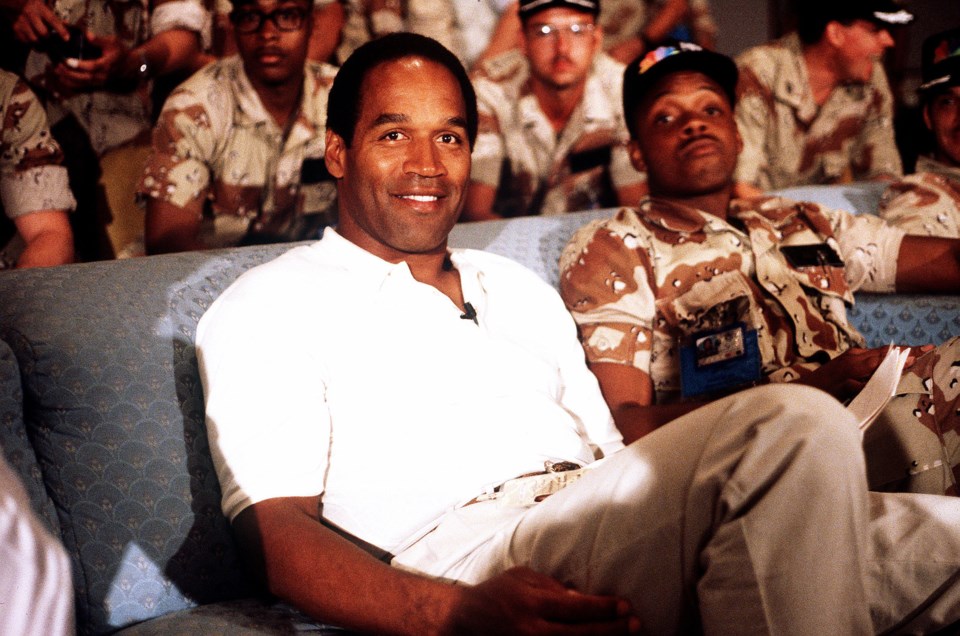Whatever one thinks about the death of O.J. Simpson — and schadenfreude has abounded the last 24 hours — you can trace back much of the mass-media dystopia you currently live in to him alone.
I was a teen on June 17, 1994, just trying to watch Game 5 of the NBA Finals between the Houston Rockets and New York Knicks. Nobody ended up seeing much of that game, because NBC cut away from it — like almost every other TV network in North America did that evening — to cover the low-speed pursuit of Simpson in a white Ford Bronco.
By the next morning, I wanted to be in media. What I didn’t know at the time was that the incident had changed media forever.
Flash-forward to roughly a year later, when my dad procured me an after-school job as an election enumerator (this was the provincial election that swept Mike Harris to office, a moment that changed the course of Ontario history—if you don’t believe me, drive on the 407 sometime). This involved going door-to-door in Fonthill checking that people were registered to vote. One woman I recall seemed particularly annoyed by my arrival.
“I don’t know why any of this matters,” she huffed.
In the background was the unmistakable voice of defense lawyer Johnnie Cochran, holding court at Simpson’s murder trial on her TV.
When Simpson’s not-guilty verdict was delivered that fall, many a white person was shocked by the disparity of the reactions along racial lines — cheering students at HBCU Howard University vs. stunned, mouth-agape Starbucks patrons. (It took another quarter-century and the video-recorded death of George Floyd for many more to recognize that experience with police and the criminal justice system often differs greatly along racial lines.)
Of course, the idea that the wealthy Simpson was a random, racialized Black American was a crock. In Ezra Edelman’s seminal documentary “OJ: Made in America” (recommended viewing alongside Brett Morgen’s epic “June 17, 1994”) writer Robert Lipsyte relayed a story of Simpson saying of a woman that she “knew I wasn’t Black, she saw me as O.J.”
But thanks to a Los Angeles Police Department that employed people such as Daryl Gates and Mark Fuhrman — and just a few years earlier had seen four of its officers recorded beating motorist Rodney King to a pulp — Simpson’s high-priced defense team masterfully played the race card.
Simpson’s high-priced defense team masterfully played the race card
After the verdict, Cochran offered the summary that the colour of justice in America wasn’t black or white, but green.
The media, meanwhile, began its descent almost immediately. Not long after Simpson’s surrender, David Letterman told Howard Stern that he was avoiding jokes about it because double homicide wasn’t funny. That may have lasted about a week. Soon enough, mainstream media jokes about the case were rife, and some of them were quite funny. The late, great Canadian comic Norm MacDonald, greeting Heisman Trophy winner Charles Woodson at an ESPY awards, said the trophy “was something they can never take away from you, unless you kill your wife and a waiter.”
By the time I was working in media a decade later, the quest for sensationalism was palpable, and I was more than happy to be a part of it. I obviously had no experience pre-O.J., but a simple tour of YouTube will indicate that networks such as CNN blatantly shifted from covering straight news to tabloid-style, celebrity-infused fluff and pointless double-box arguments around this time. Suddenly, salacious court cases in obscure locations — as long as they involved attractive people — became international news. The entire Kardashian family rose to prominence when Kim made a sex tape with rapper Ray J. Why was she even a “celebutante” in the first place? Because her dad was notable as O.J. Simpson’s friend.
Of course today cable news and linear television are going the way of newspapers. What is filling the void? Social media clips, some possibly fake, boiled down to the lowest common sensational denominator, with celebrities and “influencers” bypassing the traditional gatekeepers to fill heads with whatever they see fit. You can trace it all back to June 17, 1994.
As far as Simpson himself goes, he cast a staggeringly pathetic figure afterwards. He even tried to write a book called If I Did It, the legal rights to which were brilliantly seized by the family of murder victim Ronald Goldman, who basically removed the “If”.
I’ve always thought that one of the added tragedies of Buffalo Bills fandom is the fact that O.J. remains one of their greatest all-time players. But many fans today, including myself, weren’t even around to see him play. He’s remembered for everything that came after.
There’s always an unease among people when a pariah-like figure dies. Why do we talk about it or “glorify” the person? I submit that many of us are not glorifying him at all, we’re simply noting the death of a person that — unlike the vast majority of us — had some form of impact on society. Whether we like it or not, that’s who he was, and what he did.

